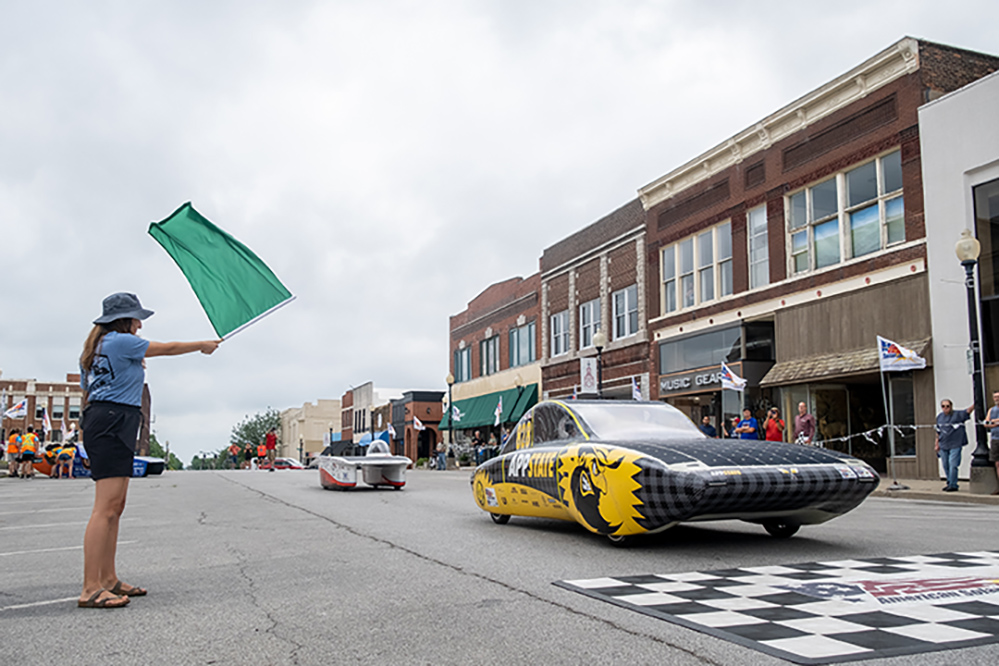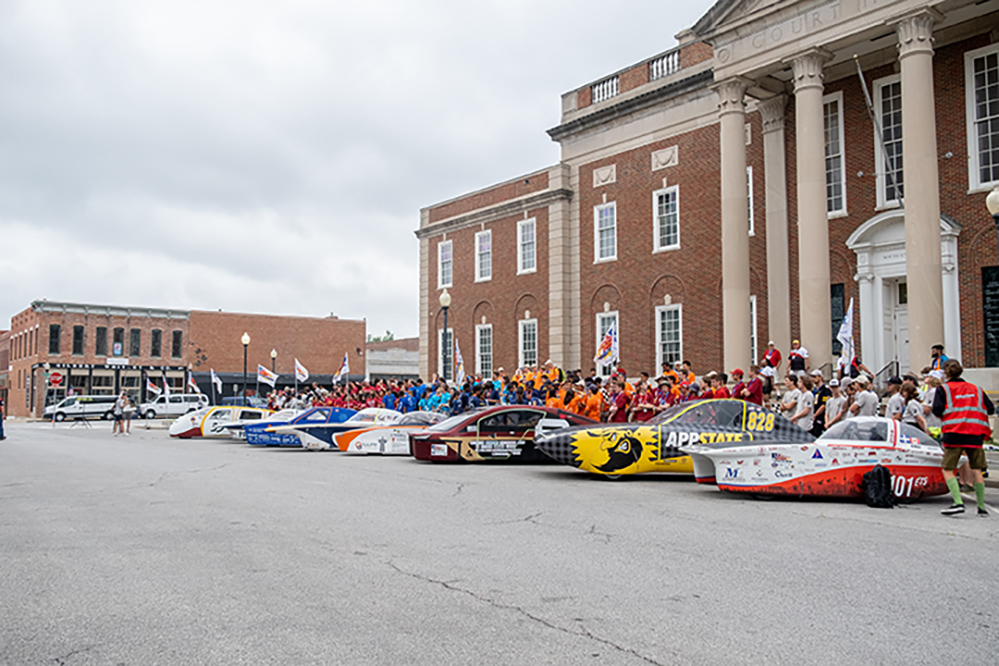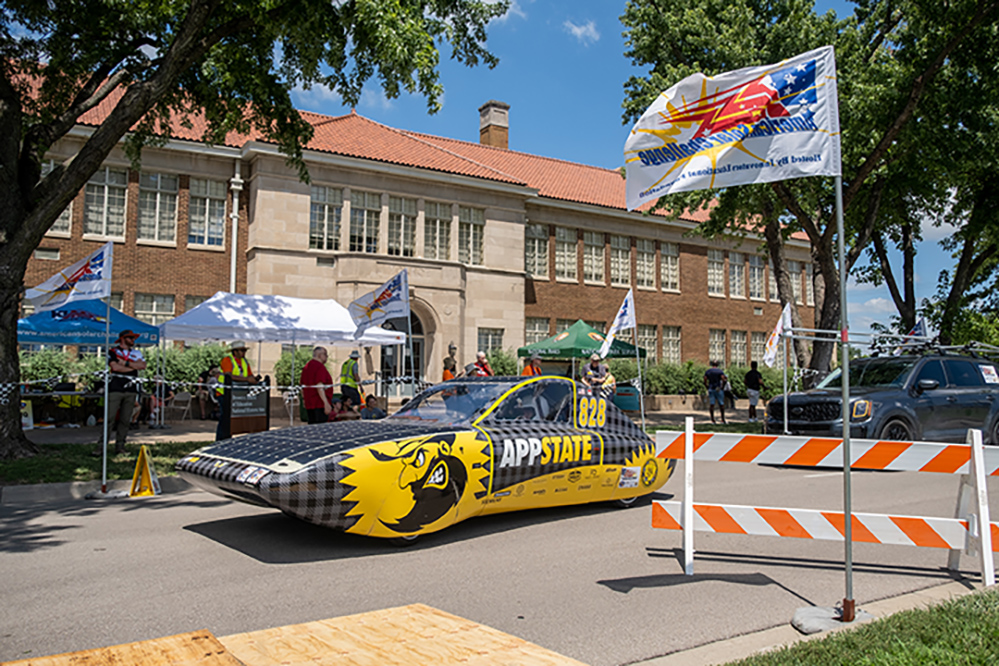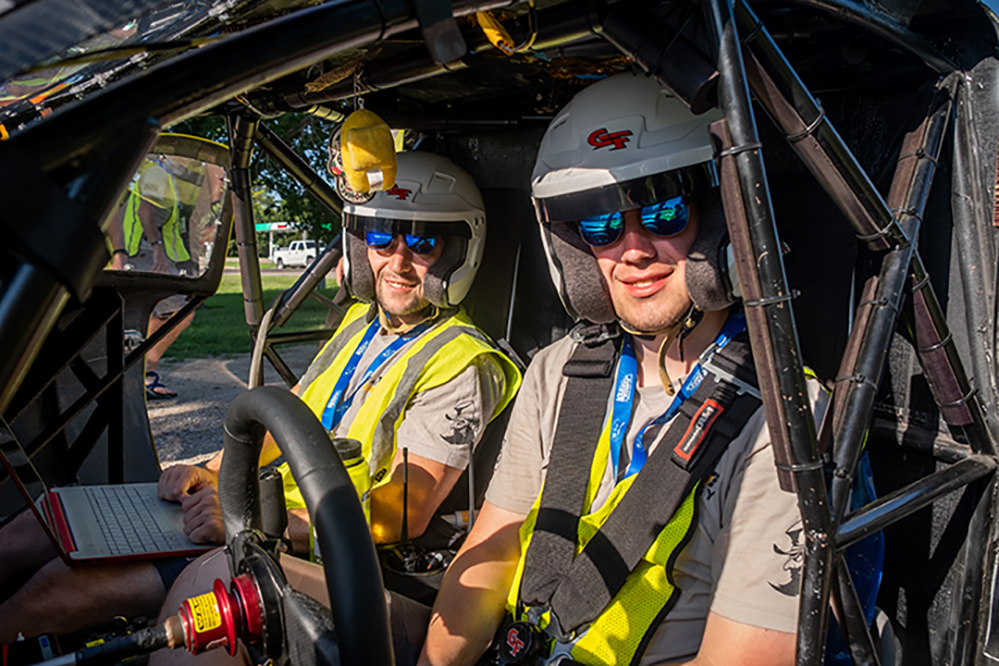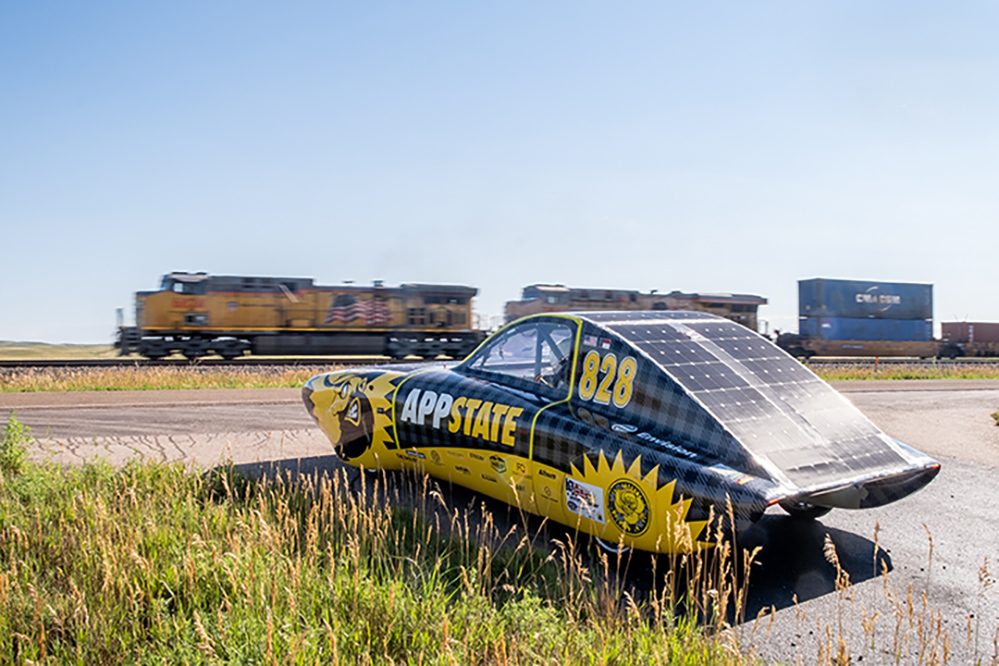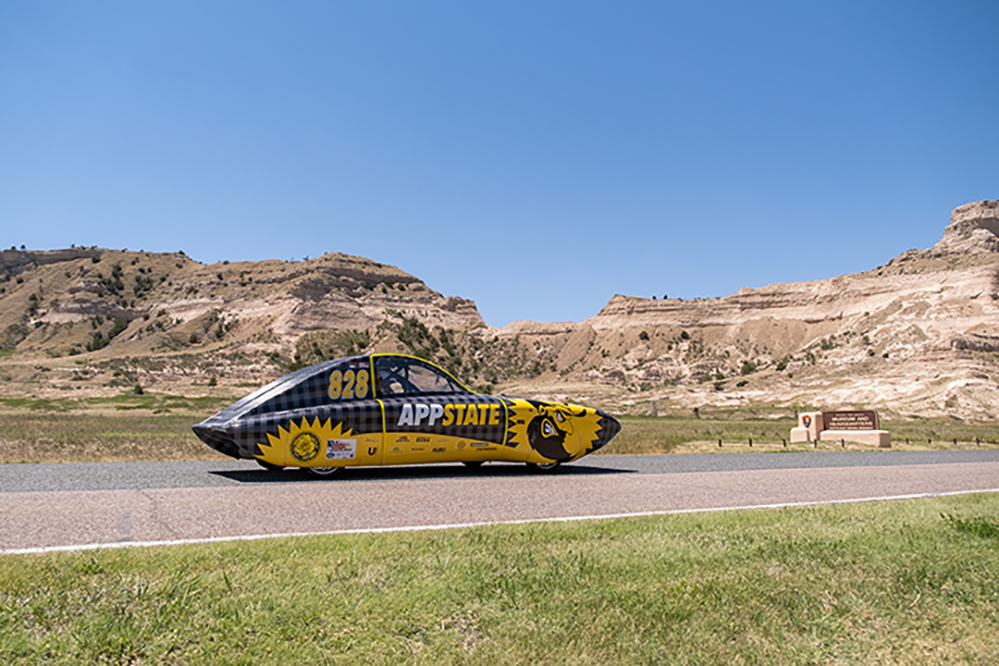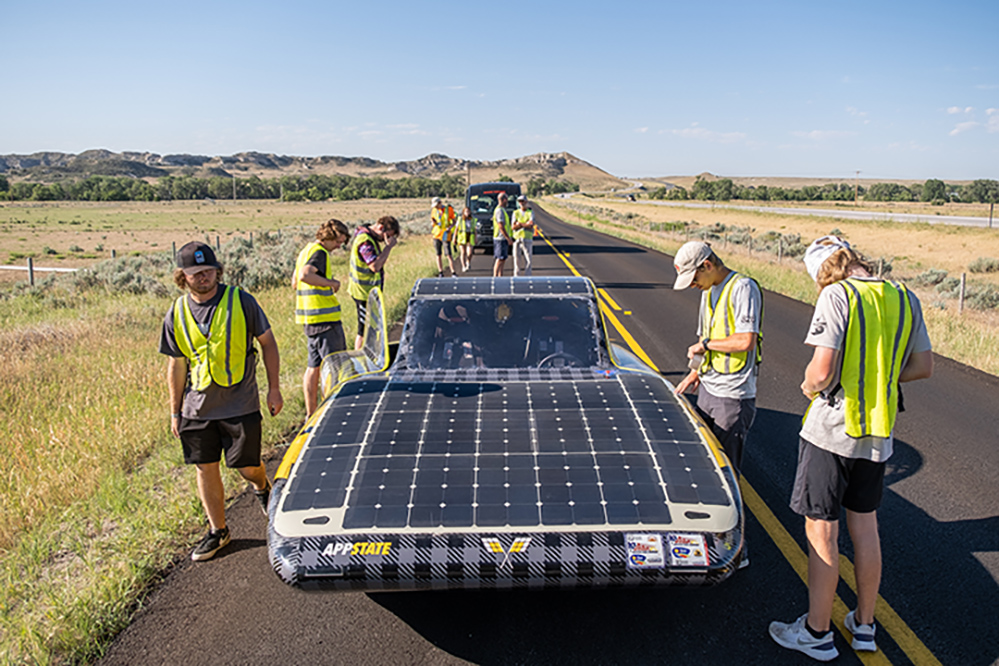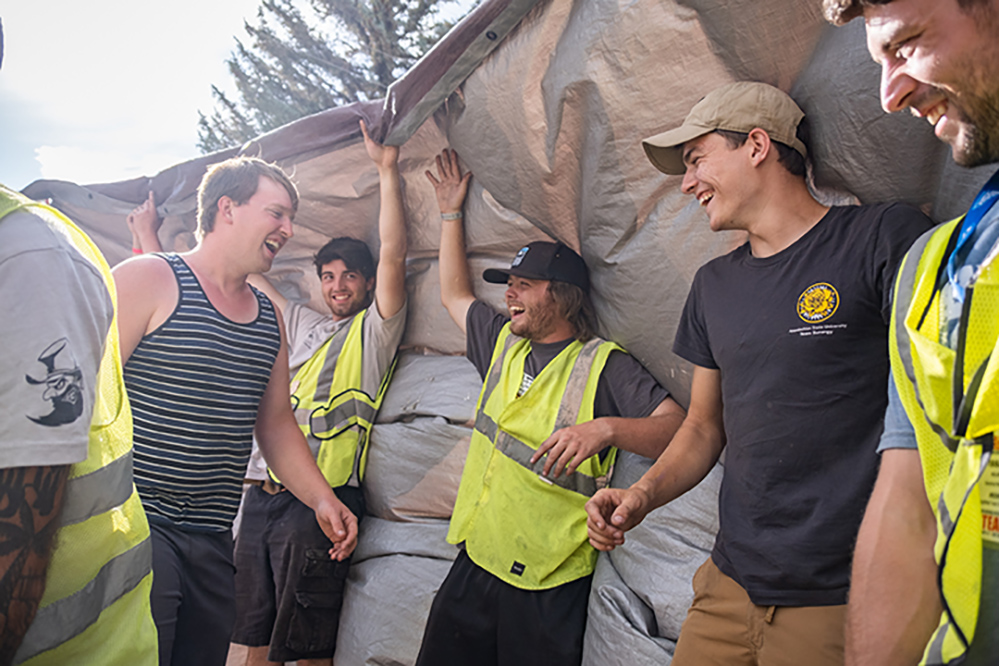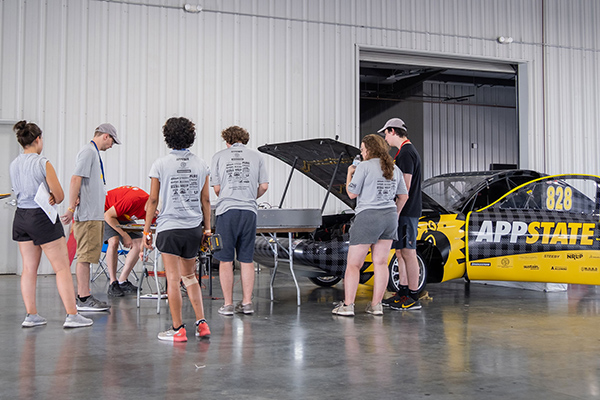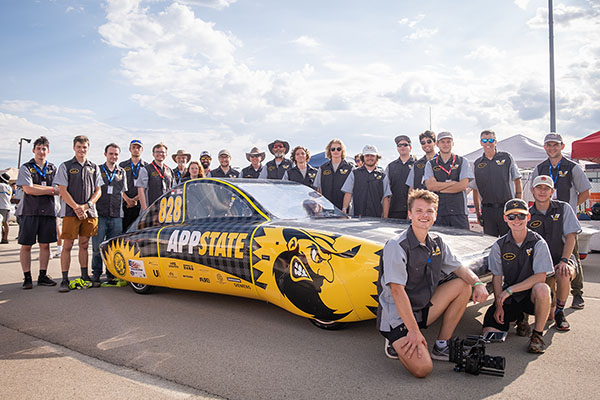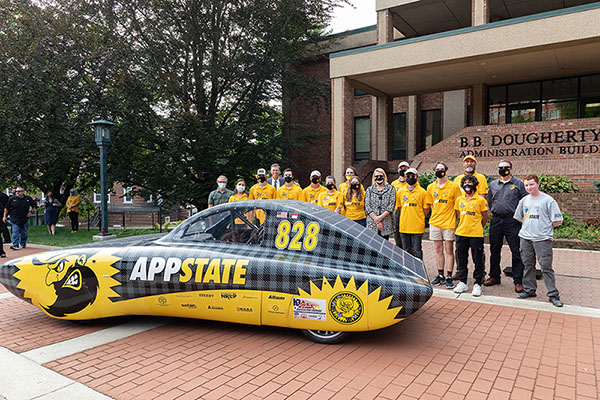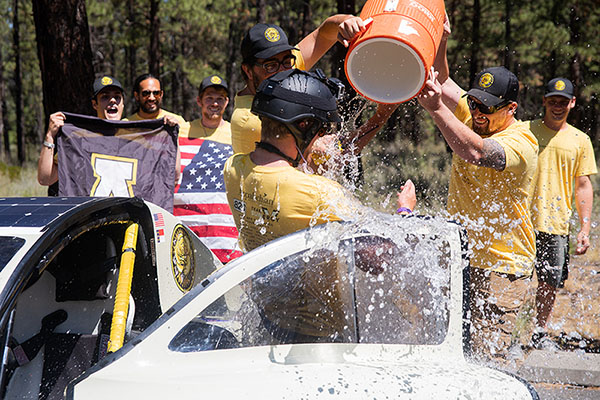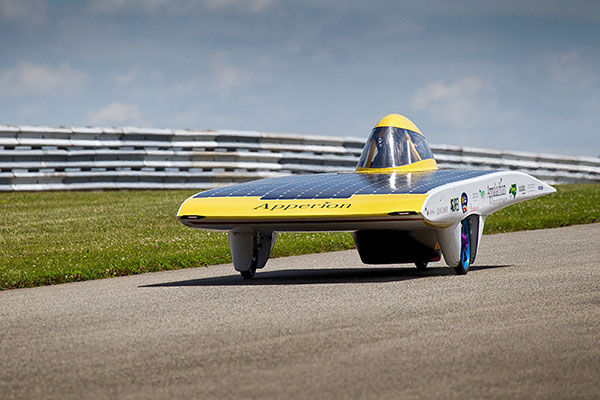BOONE, N.C. — Appalachian State University’s student-run solar vehicle team, Team Sunergy, overcame several obstacles in the 2022 American Solar Challenge (ASC) — including brake and electrical issues — to secure a second-place finish in the competition’s multi-occupant vehicle (MOV) category. The team completed 1,549 miles over the eight-day road race across the historic Oregon Trail and took home the event’s Electrical Design Award for the second year in a row.
“Throughout their participation — and wins — in these international competitions, Team Sunergy students have served as sustainability ambassadors for App State, the state of North Carolina, the country and the world,” said App State Chancellor Sheri Everts. “They are the epitome of true Mountaineer spirit, and I am extraordinarily proud of their ingenuity, perseverance and teamwork.”
Racing its MOV cruiser, ROSE (Racing on Solar Energy), defending ASC champion Team Sunergy came into the grueling challenge after successful scrutineering (a required series of inspections and tests) and a solid qualifying performance at the Formula Sun Grand Prix (FSGP) track race held the previous week. App State was one of 10 university teams — which included top engineering schools MIT and University of California, Berkeley — that qualified to compete in this year’s ASC.
“This adventure was like running an ultramarathon for eight straight days. There’s a lot of brainpower behind this — it’s not a sprint,” said Lee Ball, Team Sunergy adviser and chief sustainability officer at App State. “Every morning the team was up at six. Some nights, team members stayed up until three, four or five in the morning — with some working around-the-clock.
“I watched this team grow through the challenges they faced and the obstacles they overcame, with each member stepping up to put in the time and work that led to App State’s strong finish,” Ball continued. “Their perseverance is inspiring as they push the envelope of sustainable technology.”
After arriving at the FSGP with an uninstalled, untested battery, the team was unsure how ROSE would do. Once they qualified for the ASC, the team was ready to tackle the challenges of the open road course across the Midwest.
Stage 1: An arduous start
Team Sunergy achieved early success in the challenge, racing ahead of its competitors to take the lead on day one of the first stage. Then, the first challenges surfaced — braking issues and a damaged wheel bearing.
“The expectation of the team when we left for ASC was to do our best and support each other,” said Logan Richardson, a first-year team member and computer science graduate student from Fayetteville. “With the brake issue, the mood was stoic determination — we all jumped into action. Giving up was not an option.”
The team received a helping hand in Deshler, Nebraska, where Rod Watson, a local community member and an auto technician, offered to repair ROSE’s damaged bearing, getting the car back in the race.
With the wheel and brake issues behind them, Team Sunergy began the quest to get ROSE back in first-day form and catch up with its rival — the well-respected team from the University of Minnesota (UMN).
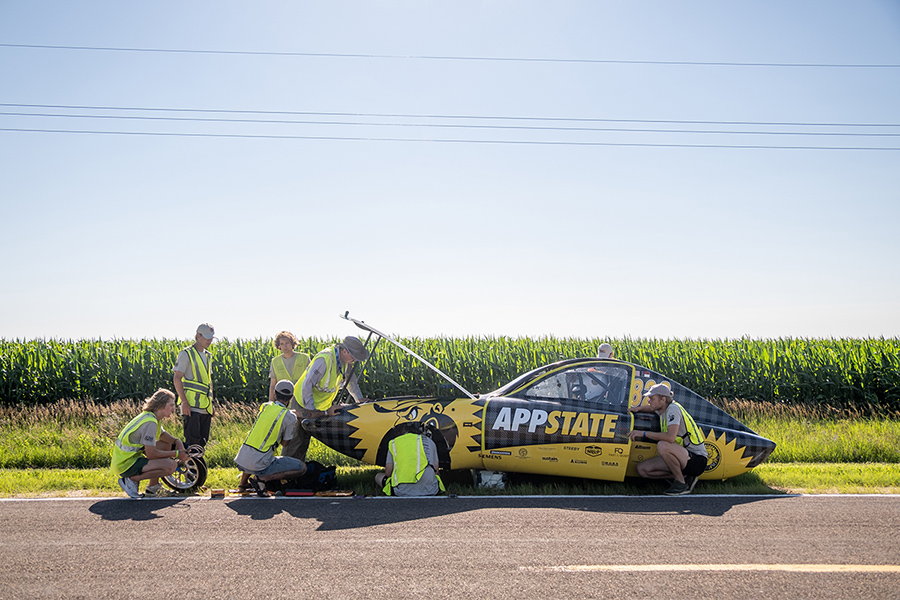
App State’s solar vehicle team, Team Sunergy, works to repair ROSE — its student-built, multi-occupant solar vehicle — during the 2022 American Solar Challenge. The team made multiple repairs on the vehicle outside Deshler, Nebraska, that included a damaged wheel bearing and brake caliper. Even with these setbacks, Team Sunergy finished the 1,549-mile race along the Oregon National Historic Trail, placing second in the competition’s multi-occupant vehicle category. Photo by Kyla Willoughby
Stage 2: Electrical trial and error
Stage two began with ROSE needing to be repaired, again — this time the challenge was an electrical issue.
“We have two incredible electrical engineers, Matt Allen and Nicole Sommerdorf,” said Richardson. “In that moment, the best thing we could all do as teammates was just give them space to work. We knew they would figure it out, and they did — brilliantly.”
Allen, a four-year team member and Chapel Hill native, and Sommerdorf, a two-year team member from Raleigh, worked for 10 hours through the night to get ROSE back on the road. Their efforts resulted in the team winning the 2022 ASC Electrical Design Award. Allen is majoring in sustainable technology while pursuing his graduate degree in engineering physics through App State’s Accelerated Master’s program, and Sommerdorf is double majoring in environmental science and sustainable technology.
The team had lost valuable time, which is a large factor in determining the race outcome. The winner is determined by distance and time completed, with penalty miles and infractions based on being unable to reach the required average speed — 35 miles per hour (including stops and driver changes). The team would average more than 270 miles over the next two days before reaching the stage two finish line.
“This type of competition is grueling and long, and anything could happen to any team at any time,” said Team Sunergy Adviser Chris Tolbert. “If the car is running, you’re not out of the fight — no matter how far behind a team seems to be on any given day.”
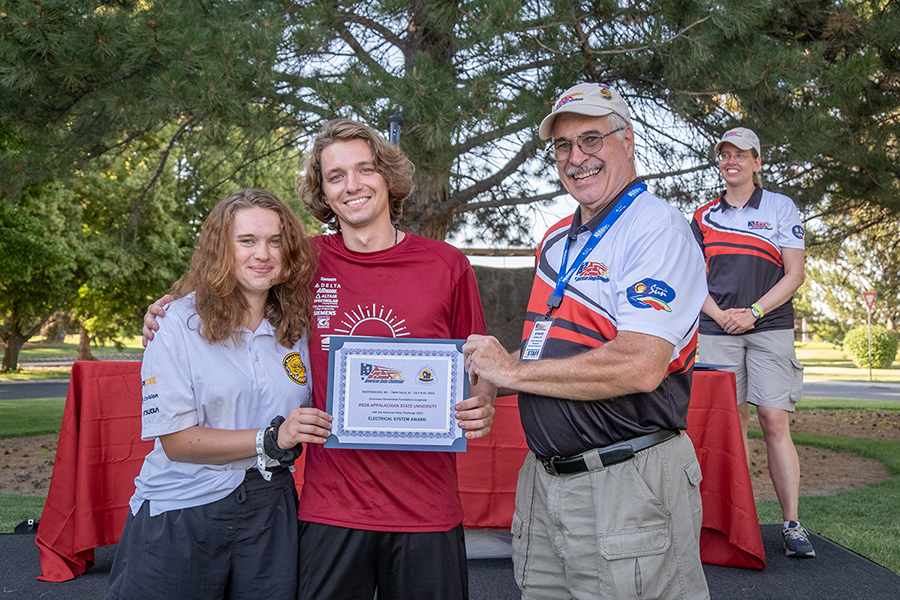
Team Sunergy’s Nicole Sommerdorf, far left, and Matthew Allen, center, receive the 2022 American Solar Challenge Electrical Design Award. Allen, a four-year team member and Chapel Hill native, is majoring in sustainable technology while pursuing his graduate degree in engineering physics through App State’s Accelerated Master’s program. Sommerdorf, a two-year team member from Raleigh, is double majoring in environmental science and sustainable technology. Photo by Kyla Willoughby
Stage 3: Climbing to first place
In stage three, ROSE began its steepest climb of the course — the South Pass climb, a 3,100-foot climb to the highest point on the course of 8,469 feet in the first 30 miles after leaving Lander, Wyoming. The team was unsure of how ROSE would handle the ascent, but the car did well; the team even had time to pull ROSE over, allowing the car to cool down before reaching the checkpoint.
On day two of the third stage, ROSE returned to its first-day form — with the obstacles and trials of the race’s early stages now a memory, ROSE took off across the Wyoming plain.
While the team came to realize that winning ASC was out of reach, the crew enjoyed what they described as the “smaller victories,” including racing ROSE at its top speed and the opportunity to pass other teams — especially the UMN team.
“We could see Minnesota’s convoy in front of us and the gap shrank with every minute that passed. Eventually we were right on their tail,” said Aaron Green, a first-year team member and finance and banking major from Charlotte who was copiloting this leg of the race. “We passed them carefully and respectfully, waving as we passed. No one said anything over the radio, but I’m pretty sure everyone on the team had a little smile on their face.”
This advancement led to Team Sunergy earning a first-place finish in stage three — an encouraging moment that set the mood for the final day of racing.
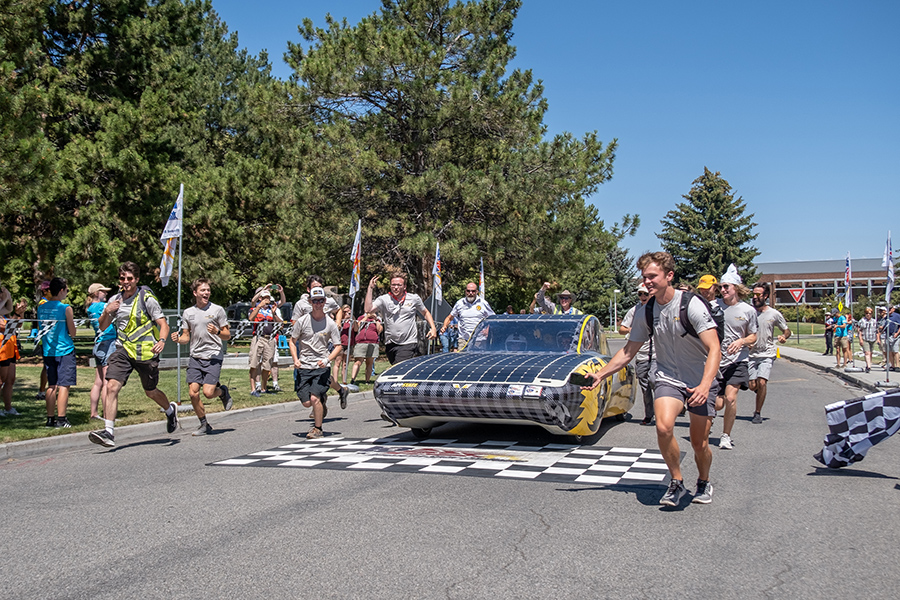
ROSE, App State’s multi-occupant solar vehicle, and Team Sunergy cross the 2022 American Solar Challenge finish line in Twin Falls, Idaho, to complete its eight-day, five-state journey over 1,500 miles along the Oregon National Historic Trail. Team Sunergy came in second place in the race’s multi-occupant vehicle category — overcoming numerous mechanical and electrical obstacles and making friends with competitors and locals along the way. Photo by Kyla Willoughby
Stage 4: An ‘amazing’ finish
Despite the many setbacks Team Sunergy encountered while racing across America’s heartland, ROSE was the first solar vehicle to cross the ASC finish line in Twin Falls, Idaho. This was a victory in itself, given ROSE’s starting position — behind all other competitors, both multi- and single-occupancy vehicles. Team Sunergy knew it could not win ASC due to its challenges from the earlier stages; however, finishing strong would build momentum for the next solar competition.
“The last day was amazing. Our starting position meant we would need to pass multiple teams to finish the stage first — and cross the finish line first,” said Tolbert. “As the miles started to pass, we were able to make our way around each team. Once we passed the last competitor, ROSE took off and created distance between us and the field.”
“We were overwhelmed with joy and proud of how far we’d come. Finishing first paled in comparison to the sheer elation of crossing that finish line, regardless of position,” Richardson said.
“It was really fun to cheer on other teams as they crossed the line, too,” he added. “There was a sense of camaraderie. All the teams that made it to the finish line, no matter how they got there, earned that moment.”
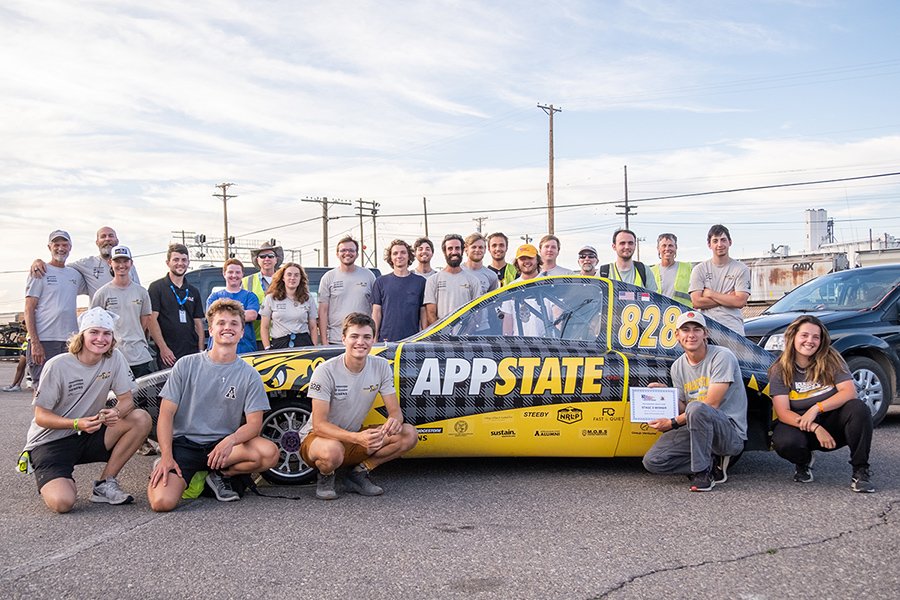
Members of Team Sunergy, App State’s solar vehicle team, pose with their student-built, multi-occupant solar vehicle — ROSE — after winning the third stage of the 2022 American Solar Challenge. The team raced ROSE across five states, from Independence, Missouri, to Twin Falls, Idaho, over eight days to secure a second-place finish in the competition. Photo by Kyla Willoughby
With new lessons learned through the American Solar Challenge, Team Sunergy’s members returned to Boone and to their garage, where they are already hard at work preparing to take on the competition in next year’s solar race.
Since 2016, Team Sunergy has earned top three wins in either the American Solar Challenge or its companion competition, the Formula Sun Grand Prix.
The team began in fall 2013 as a class project to build a solar-powered golf cart and developed into an interdisciplinary team of App State students, faculty and staff working together to research and develop solar-powered race cars. Supported by faculty from its inception, it was institutionalized and funded by Chancellor Everts — the team’s No. 1 fan. As a result of all of their accomplishments, Team Sunergy is now recognized by the international solar racing community.
Learn more about Team Sunergy by visiting https://sunergy.appstate.edu/.
What do you think?
Share your feedback on this story.
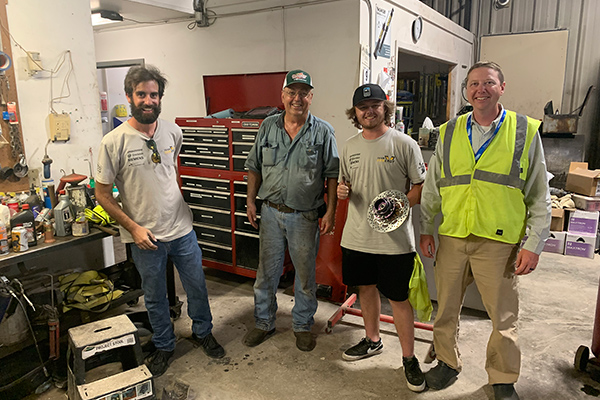
App State’s Team Sunergy received critical mechanical assistance for ROSE from a local auto technician in Deshler, Nebraska, on July 10. Pictured, from left to right, are John Diekmann, a first-year team member and sustainable technology major from Asheville; Rod Watson, the auto technician who assisted Team Sunergy and who works at Deshler Motors; Patrick Laney, a four-year team member and sustainable technology major from Matthews; and Team Sunergy Adviser Chris Tolbert. Photo by Lee Ball
An Appalachian team seeks to change the future of transportation with a solar race car
About App State’s Team Sunergy
Appalachian State University’s internationally recognized Team Sunergy is an interdisciplinary, student-led team with a passion for sustainable transportation — and the ingenuity, innovation and drive to create it. The team began in fall 2013, as a class project to build a solar-powered golf cart, and has evolved into an award-winning program that has achieved podium finishes in every year of competition in both the Formula Sun Grand Prix and American Solar Challenge (ASC), including a first-place finish in the 2021 ASC. Both races set the standards for and test the limits of solar vehicle technology. Team Sunergy’s first vehicle, Apperion, was a modified single-occupant race car. In 2018, the team designed and built its current, two-passenger, Cruiser Class car, ROSE (Racing on Solar Energy), from the ground up. Learn more at https://sunergy.appstate.edu.
About Sustainability and Energy Management at App State
Appalachian State University’s leadership in sustainability is known nationally. The university’s holistic, three-branched approach considers sustainability economically, environmentally and equitably in relationship to the planet’s co-inhabitants. The university is an active steward of the state’s interconnected financial, cultural and natural resources and challenges students and others think critically and creatively about sustainability and what it means from the smallest individual action to the most broad-based applications. The university offers both undergraduate and graduate academic degree programs that focus on sustainability. In addition, 100 percent of Appalachian’s academic departments offer at least one sustainability course or course that includes sustainability, and all students graduate from programs that have adopted at least one sustainability learning outcome. Learn more at https://appstate.edu/sustainability.
About Appalachian State University
As a premier public institution, Appalachian State University prepares students to lead purposeful lives. App State is one of 17 campuses in the University of North Carolina System, with a national reputation for innovative teaching and opening access to a high-quality, cost-effective education. The university enrolls more than 21,000 students, has a low student-to-faculty ratio and offers more than 150 undergraduate and 80 graduate majors at its Boone and Hickory campuses and through App State Online. Learn more at https://www.appstate.edu.

